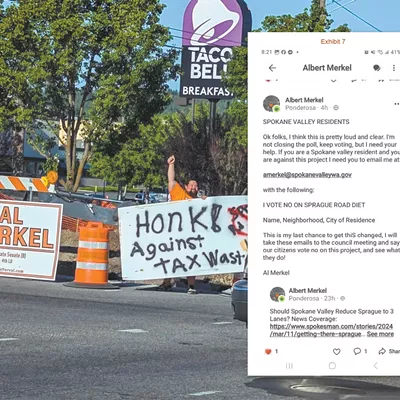
There was one thing, at least, that the city of Spokane communicated clearly about the homeless shelter on Cannon Street.
"It was pretty clearly stated to us that at the end of May, Cannon was going to be closing," says Council member Jonathan Bingle.
"End of May," Brian Coddington, the city's director of communications, said in March.
"End of May," the Spokesman-Review reported in April.
Which is why, when it closed four weeks early, it took many people by surprise.
Bingle was in Philadelphia, talking on the phone to Council member Michael Cathcart, who asked if he knew about Cannon closing.
"I was like, 'No!'" Bingle recalls. "That's a big piece of information that we should probably know. Maybe a heads-up."
None of the council knew either. Even Mayor Nadine Woodward was caught unaware.
"I didn't even know it was closed that quickly," she says.
And the missed communication was compounded by another miscommunication.
On May 3, the same day news of the Cannon shelter's closure broke, staffers at the Trent shelter began turning homeless people away, claiming falsely that it was full.
A simple mistake, perhaps, but the same thing had happened five months before. As Council President Breean Beggs sat in his car in December, watching people get turned away from the Trent shelter, Coddington was "sending out emails to council, 'No, that is not true. Nobody is being turned away,'" Beggs recalls. "I'm there. Watching people get turned away."
It wasn't dishonesty, Beggs says. Coddington just didn't know what was happening.
"The Woodward administration is disorganized," Beggs says. "One person doesn't know what the other person is doing."
Beggs, Bingle, Cathcart and every other council member have offered their own lamentations about an inability to get timely answers and clarity over the past four years. They've, at various times, blamed an overwhelmed communications director, staffing shortages, COVID or a mayor who's delegated away too much of her job. They've spoken out in public meetings and in newspaper articles. Woodward's staff have issued apologies.
And yet Woodward — who meets with Beggs and Council member Lori Kinnear weekly — says she hasn't heard any complaints.
"Council has said there's a problem with communication?" she says, appearing surprised. "With what, the administration?"
Asked if any specific areas of communication with the council could have gone better, the mayor is unequivocal.
"No," she says.
Beggs says he has personally spoken to Woodward about communication gaps, especially regarding finances and homelessness, but finds it more productive to raise complaints with her senior staff.
"She does not seem particularly engaged on these issues," Beggs says.
ALL ROADS LEAD TO CODDINGTON
Coddington isn't someone who wants to be surprised. He's notified every time a reporter requests a public record and every time a record is sent."What are you working on?" Coddington pressed the Inlander in a 2021 phone call, audibly irritated that we'd requested the calendars of high-level city officials. "You targeted three city administrators, me, the chief of staff and the mayor."
The reason for the request was simple: Even back then, word at City Hall was that, increasingly, Coddington had been handed powers traditionally reserved for a mayor or city administrator.
By this January, there wasn't any mystery about it: That's when Woodward formally elevated him to become her unofficial chief of staff, in charge of the mayor's plans and initiatives. Add on his interim role as director of CityCable 5 — Spokane's C-SPAN — and the whole city teeters on his shoulders.
But Beggs says there's a cost. "When he's trying to do two or three different jobs, he's stretched too thin," Beggs says.
Woodward, a former TV anchor, was elected mayor with three decades of communications experience under her belt, but almost no administrative experience. One of her first acts was hiring back Coddington, who worked for more than five years as her predecessor's spokesperson.
"Brian is an incredibly talented and skilled individual," Woodward says.
But less than three months into her term, the pandemic put both to the test. City Hall was nearly empty, workflows had to be radically reinvented, and Coddington was assigned to the Emergency Operation Center to handle the COVID response. Still, he found ways to increase the mayor's visibility.
"There is a community and media expectation that she start [being] a greater presence," Coddington wrote in April 2020, according to the calendar records.
"I get being loyal. The problem is if you say something that's totally not true."
He suggested Woodward record a daily video update. It became a weekly video, taking advantage of the mayor's decades of on-screen savvy. Coddington launched a mayoral newsletter — another way of letting the mayor speak directly to the voters.
When Woodward's first city administrator departed in fall 2020, Coddington took on part of the city administrator role. Key members of his communications team were pulled away to fill growing vacancies across City Hall.
Brandy Cote — former director of the mayor's office — had been serving as Woodward's unofficial chief of staff. But, Coddington says, she was trying to do the job while living in Pullman. So when it came to in-person mayoral events, Coddington had to pinch-hit.
Now that he has the chief of staff role full time, his workload has only increased. Sometimes, his workday starts when he wakes up and ends when he goes to sleep.
"I try to take one day off during the weekend, but it doesn't always work out that way," Coddington says.
Asked if working multiple jobs has hurt his effectiveness as communications director, Coddington bristles at the question.
"Sounds like there's a right answer," he deadpans, before acknowledging, "Some days I do both roles better than other days."
Others believe that the quality of his work is at stake.
"Just on a human level, how can you keep that many balls in the air and some don't get dropped," asks Council member Betsy Wilkerson.
And the chief of staff role has added to the confusion. City Administrator Johnnie Perkins handles "operations," while Coddington handles the "mayor's initiatives." But something like homelessness involves both.
"I don't know where his authority ends and Johnnie's authority starts," Kinnear says.
For years, journalists have been frustrated when their questions to city staffers are simply forwarded to Coddington. But now some council members are in the same boat — sent through a bureaucratic obstacle course to accomplish a basic act of scheduling.
"All the communication goes through Johnnie Perkins, and then all communication goes through Brian Coddington," Wilkerson says. "So that's all a lot of communicating for sometimes just a simple meeting that neither one can make."
All communication going through Coddington isn't just an internal practice. Coddington, for example, says the administration has to be informed before a city-funded homeless shelter speaks with the media.
Coddington says he hears that internal miscommunication within the Salvation Army is to blame for people being incorrectly turned away from the Trent shelter earlier this month.
"I still don't have a good answer for how that happened," Coddington says.
That's why we wanted to talk to the Salvation Army. But the Salvation Army didn't respond to repeated phone calls and emails. The last time we reached out, our questions were forwarded to Coddington.
Combined, it's a Möbius strip of unanswered questions. A repeated screw-up impacting some of Spokane's most vulnerable residents. And the public doesn't know why.
APOLOGY TOUR
For their parts, Coddington and Woodward cast the Cannon shelter's quicker-than-expected closure as a triumph, not a communications error.
"To me, that's a good thing," Woodward says. "When we're able to beat a goal that we had."
But speaking before the Homeless Coalition the day after news about the shelter closing, Kimberley McCollim, Woodward's third Neighborhood, Housing and Human Services director, was deeply apologetic.
"Quite frankly, I should have put out a notice," not just to the City Council, but to the Homeless Coalition and other local organizations, McCollim said. "I've been in the job six months, and one thing I'm learning is that I can't run as fast as I'd like to."
Woodward, for her part, says she hasn't heard these kinds of complaints from council members.
"They're not telling me there's communication issues," Woodward says. "They're not telling Johnnie there's communication issues."
But in a City Council meeting last year, Wilkerson did exactly that, hammering the administration for failing to share key financial details about plans to lease the Trent shelter.
"I'm the person who's trying to help keep the city financially whole, and I was the last person to know," Wilkerson said.
Perkins apologized profusely and swore to do a "much better job of being more communicative" across the board.
Beggs sees a trend.
"They take the blame for things all the time. 'Oh, totally my fault.' I'm like, 'No it's not,'" Beggs says. "I get being loyal. The problem is if you say something that's totally not true: Why do I believe anything that you say, ever?"
Ironically, he suggests, that just feeds mistrust.
Council member Zack Zappone, a progressive and staunch critic of the mayor, sees something closer to sabotage. He blames an excessive focus on politics. Wilkerson has her suspicions that some things are "slow-rolled."
Even Bingle, who says he "has decent communication with the administration" that has only improved, says he sometimes has to call a staffer multiple times before he gets an answer.
"I don't think it's because they don't want to give anything over," Bingle says. "I think it's because they're truly short-staffed."
In recent years, council members say they've struggled to get answers on the mayor's plan for cooling centers during heat waves, rental assistance spending and replacing homeless shelter beds when a shelter closes. Some administration data, like quarterly reports on the city's homeless population, is required by law, but council members say they haven't seen them. Same for financial data.
Council members say the lack of information leaves them fumbling in the dark — making consequential, long-term decisions without a complete picture of the city's problems.
"Sometimes it is hard understanding what our policy is," Bingle says. "Maybe it was because we had a bunch of new people in positions that didn't really know the policy."
Despite the heavy criticism, council members acknowledge that not all of the blame falls on Woodward. Cathcart says communication is one of Beggs' weaknesses as council president.
"We all could do better," Wilkerson says. "I'm not saying I have no dirt on my shoes."
THE CONDON CONTRAST
Frustration over communication comes as the city faces a looming budget shortfall. Meanwhile, there have also been slews of canceled meetings — including one where the mayor declined to attend partially because she didn't want to hurt employee morale by speaking about budget cuts with council.
"Nobody wants to lay off employees or make cuts, but putting your head in the sand doesn't make it go away," Wilkerson says.
But Woodward points her finger right back at the council.
"They can make up things all they want," the mayor says. "But they can come in here and ask me any question they want."
She argues that her administration often has provided answers to council questions for funding options for the Trent shelter on multiple occasions — the council just hasn't liked the answers.
And if the council thinks that Coddington is stretched too thin? They turned down a proposal to make the position official last year, balking at the proposed $148,000 salary.
"Council has refused to approve or support the chief of staff position in my office," Woodward says.
They also rejected Woodward's plan to create a deputy city administrator.
"We have no bench strength in the organization," Woodward says. "In Salt Lake City, they have four to seven times the staff that I do."
By contrast, the number of City Council staffers has exploded — including putting an employee in a chief of staff role.
But Beggs says his sense was that Woodward needs to do a bit more "CEO work" herself as mayor, instead of adding more high-priced help.
After all, the previous mayor, David Condon, didn't have a chief of staff.
"Every mayor does things differently," Woodward says, noting that Condon had temporary project employees to help. Also, Condon was happy to dive into the bureaucratic muck, sifting through the city's problems at incredible levels of details.
"He had a different level of interest in data," Coddington says. "Almost to the degree of being a little bit of a data wonk."
When the City Council asked for data during the Condon years, his administration was often already keeping track of it.
Sure, the Condon administration wasn't exactly known for being a paragon of transparency. While serving as Condon's communications director, for example, Coddington had denied that a police chief's job was in danger the day after he'd written the press release announcing the chief's forced resignation.
But Beggs says Condon's flaws were preferable to the chaos and confusion of the Woodward administration.
"They were more organized and knew what was happening," Beggs says. "There was somebody keeping the trains running on time."
Council member Karen Stratton, whose relationship with both mayors soured a few years into their tenures, is even harsher about Woodward.
"I don't think that she knows what she's doing. I really don't ... I don't think that she has a grasp on some of the issues and the way government works," Stratton says. "Coddington — it feels to me like he is the one running City Hall."
Yet more than one staffer who has exited City Hall has pointed to the City Council's interference — its members' criticism of the administration and their demands on employee staff time — as one reason they quit.
Unlike many other overloaded staffers in the Woodward administration, Coddington has stuck with it. Because, when it comes right down to it, Coddington comes across as a true believer in what the city's trying to accomplish.
"I want to be a small part of trying to get some of those things across the finish line," Coddington says. ♦






























